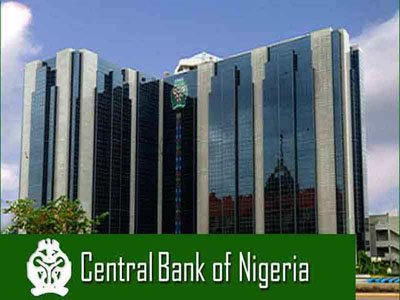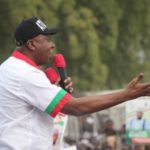
FOR the first time in more than two years, the Monetary Policy Committee (MPC) of the Central Bank of Nigeria (CBN) yesterday adjusted interest rate downwards to 13.5 per cent.
Central Bank Governor Godwin Emefiele told reporters after the second MPC meeting that “the MPC voted to adjust the Monetary Policy Rate (MPR) by 50 basis points from 14 to 13.5 per cent; retain the asymmetric corridor of +200/-500 around the MPR; retain CRR at 22.5 per cent and retain the liquidity ratio at 30 per cent.”
Emefiele said in arriving at the decision to adjust MPR (interest rate) downwards, “the committee was convinced that doing this will further uphold the banks’ commitment to promoting strong growth by way of encouraging credit flow to the productive sectors of the economy.
“The MPC also felt that through loosening by a marginal rate, will serve to manage the sentiments in the capital flow market owing to the wider spread in yields in the emerging markets and the developing economies relative to the advanced economies. Moreover, the real interest rates will still remain positive.”
Asked if there was a relationship between slashing interest rates and the loosening stance of the MPC as signalled yesterday, and funding Small and Medium Enterprises (SMEs), Emefiele explained: “To a reasonable extent, there is a relationship between lending to not just SME but to the agriculture, manufacture and the real sectors of the economy and our decision today.
“The reason being that if you consider the fact that, for instance, January 2017, inflation had risen 18.72 percent and by December 2017, as a result of the pressure on the foreign exchange market, reserves have dropped to about $23 billion and by that same month, even what was accruing into Central Bank had dropped to about $500 million from as high as over $3 billion sometime in August 2013/2014.
“Exchange rate as a result of the pressure had accelerated to as high as N525 to a dollar. But if you compare those numbers with where we are today, the inflation at 11.3 per cent, foreign reserves at close to $45 billion, and we feel this trend will continue. Exchange rate converging in all the markets at between N358 to N360, GDP being in positive trajectory consecutively for five to six quarters, then you will agree with me that there is relative stability and we have proved that there is sustainability in the level of macroeconomic indices in Nigeria.”
Defending the decision further, Emefiele noted that “having being on this part, particularly the MPR at about 14 per cent since July 2016, and with the relative stability we have seen in the macroeconomic variables over the last two to two and a half years, we just think that this should be the next phase where we begin to think about consolidating growth. This should be the next phase where you should be talking about how do we create more jobs and reduce the level of unemployment in our country for people.
“We believe this should be the next phase where we should be talking about how do we diversify the base of the Nigerian economy? And that in doing that, we will continue to keep our eyes on the stability that we have achieved so far in the macroeconomic environment. We will continue to do what we have been doing that is keeping inflation low, we will continue to do what we are doing that is keeping the exchange rate stable, we will continue to do what we are doing to ensure the reserves remain on positive trajectory at comfortable levels to be able to sustain the level of growth in our economy.”
The CBN boss, however, sounded a note of caution, saying “there is a need for us to say, listen, we need to consolidate on what we have achieved so far and that is to begin to look at the level of growth again.
“Looking at growth again also means that while keeping our eyes on those other parameters, let’s see whether we can signal a direction from the monetary policy to the direction of supporting and really accelerating growth in the country.”
Accelerating growth, he explained, “means that we need to push harder to consolidate GDP, we need to push harder to make sure we create jobs and we need to push harder to diversify.
“So, doing this will naturally mean that we are softening gradually, but I repeat and it shouldn’t be mistaken that we will continue to do what we are doing, what we have done in the past, keeping inflation at a moderated level, we will continue to do so. I think we are moving in the right direction.”
Asked if this new level of ease on the interest rate will put pressure on the naira, Emefiele said: “The answer is a capital no, I don’t see that happening. Like I just told you that we have seen stability in the market over the last two to two and a half years and there is no need for anybody to worry. We will withstand any pressure.”
When questioned if Nigeria is prepared for any economic pressure, the governor answered: “We have gone through it in 2015, 2016 and 2017. With the support of everybody, our management and MPC members were able to overcome such challenges and I do not think that there is any challenge that the management of the Central Bank cannot surmount. We would surmount them.”
On the growth projection of 2.7 per cent by the CBN, Emefiele said: “We have actually been in positive growth trajectory in the last five to six quarters with an average GDP growth of about 1.9 per cent. I think that if you look at the trend from 2017 into 2018, we will naturally say that if we push hard, even harder than we have done in the past, that we should be able to attain the 2.7 per cent and three per cent growth.
“What we are just trying to say here is that with the data available, and with consistency and with the push, that we are positive we will be trending towards 2.7 per cent to three per cent in growth rate which is actually not fantastic if you consider where Nigeria’s growth trajectory has always been around five per cent.
The MPC decided by a vote of six out of 11 members to reduce the MPR by 50 basis points, that is 0.5 per cent. Two members voted to reduce MPR by 0.25 per cent – that is 25 basis points. A member voted to reduce it by 100 basis points, which is one per cent.
Two members, however, voted to hold MPR at its current level. Ten members voted to hold all other parametres constant while a member voted to reduce the Cash Reserve Ratio (CRR) by 100 basis points from 22.5 per cent to 21.5 per cent.
The CBN governor also reacted to concerns raised over the impact of the discounted CRR, stressing. “We received a couple of demands but not many of those demands met our expectations. Don’t forget that this is money – liquidity that should be sterilised in central bank as cash reserve requirement, making them available to the banks and doing that we must make sure that they go into the employment and growth stimulating sectors of the economy: like agriculture and manufacturing. We will make sure that this liquidity given to the banks must be for projects and expansion plan.”
The decision to slash interest rate, he explained, followed the action of “banks themselves which have started dropping the interest rate very marginally. But we are trying to let them know that in fact, in this case, I will say that we are following them. That is why we say that we are signaling. We are signaling in the sense that with time this will permeate the entire banking sector and people will begin to see the expected impact.”
When asked if it will be the beginning of MPC rate cutting circle, Emefiele said: “I’ve not said so. I repeat, don’t quote me wrong, I only said it is a signal, but we will continue to do what we are doing that is keeping our friends happy, keeping everybody happy. But we are going to see if it will take us to the real growth trajectory that we so desire for Nigeria.”
The MPC also noted the need to rebase the economy (GDP), which was last done in 2010.
Reacting to this development, Prof Uche Uwaleke of the Nasarawa State University said: “The reduction in MPR by 50 basis points signals the CBN’s desire to relax monetary policy to support economic growth. Obviously, it is a right response to the declining inflationary pressure and the relative stability in exchange rate which have prevailed for quite some time.
“Moreover, on the external front, crude oil price has stabilised around $65 per barrel while the US interest rate normalisation has slowed down. All these must have combined to influence the MPC decision which is expected to increase the flow of credit to the real sector.
“The reduced MPR will also be positive for the capital market as some of the increased liquidity that will ensue will flow into the equities market. Also, it will be cheaper for the government to issue bonds, given that part of this year’s budget deficit will be financed through domestic borrowing.”
You may be interested

PSG To Reignite Interest In Osimhen
Webby - December 21, 2024Paris Saint-Germain have contacted Napoli to discuss signing Victor Osimhen in January, according to reports in France.It is reported that…

Arteta Provides Injury Updates On Five Arsenal Players Ahead Palace Clash
Webby - December 20, 2024Arsenal manager Mikel Arteta has revealed that Declan Rice and Riccardo Calafiori are both available to be in the Gunners…

Carabao Cup: Spurs Edge Man United In Seven-Goal Thriller To Reach Semi-finals
Webby - December 19, 2024Tottenham Hotspur edged Manchester United 4-3 in the quarter-finals of the Carabao Cup on Thursday.Spurs raced to a 3-0 lead…
















![American Pastor, David Wilson Seen Eating The Box Of Woman Who Isn’t His Wife [Video]](https://onlinenigeria.com/wp-content/uploads/2019/10/american-pastor-david-wilson-seen-eating-the-box-of-woman-who-isnt-his-wife-video-150x150.jpg)









